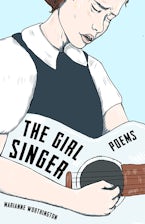Lit up and melancholy, these poems inhabit and reanimate the old songs, the ballads and fiddle tunes of the original mountain music that has no beginning and shows no sign of ending soon. Murder ballads, roaming, and redemption are all here with pining refrain. But then the book opens like a dogwood blossom to capture the music of childhood and family, as if a life of learning and wonder, love and loss is bounded by song. And so it is. These poems hit the ear like rain on a tin roof and summon a world that's heartfelt and true, because the things of that world, from the human music right down to the birds, belong to each other and to the wondrous world itself.
~Maurice Manning, author of Railsplitter and One Man's Dark
The Girl Singer is a praise song, love song, rage song, ballad, recitative, and lament for early country music singers costumed, renamed, packaged, and sold; for the poet's mother, who filmed a teenage Dolly Parton singing in a gas station parking lot; the poet's father, caught in paralysis and a fading mind; for the musicians—country and soul—who were the soundtrack of her growing up; and for the glory of being in the audience at the Ryman when Bobby Bare kissed Marty Stuart. Worthington reclaims these beloveds, along with her "maternal people" and her grandmothers, with whom she is "encircled now, all / living together." She restores her parents to their beginning—and hers—as we go with them to the Opry on their honeymoon. Through multiple forms—fixed and invented—she renders these moments. And by turns her singing words dazzle and cleave our hearts.
~George Ella Lyon, former Kentucky Poet Laureate (2015–2016) and author of Back to the Light
Patsy Cline, the Carter Sisters, Hazel Dickens, the long-dead Laura Foster—Marianne Worthington conjures them all in a stunning assemblage of voices ranging from legendary to lost, silenced, or misunderstood. The result is resonant and resplendent. 'Sketch a map that we can sing,' Worthington writes in the final poem, and that's precisely what she has managed in this pitch-perfect collection.
~Sonja Livingston, author of The Virgin of Prince Street and Ghostbread
In this lively and indelible collection, where the dead stay dancing and the crows are full of quarrel, where hands might be covered in blood or guitar calluses, Marianne Worthington's hypnotic rhythms and dazzling images transport us to barn dances, the Ryman, kitchen tables, backyard bird feeders, and Knoxville living rooms lit by the TV glow. Reverent of the thin places and defiant in their joy, these poems strum and pluck, vibrate and ring. The voice of The Girl Singer is high, clear, and true.
~Erin Keane, editor in chief of Salon.com
The book of poems you hold in your hands is both a history and a hymnal, full of the sounds of the southern mountains: a grandmother singing to charm a skittish dog, the classic country voices of the Grand Ole Opry, the unlovely and essential songs of jaybirds and crows, and the pilfered ballads of the mockingbird. Like the poet herself, The Girl Singer is funny, heartbreaking, unsentimental, and wise. It's as pitch-perfect a book as I have read in a long time.
~Doug Van Gundy, author of A Life above Water
Poetry is always looking for voices from the wilderness, and with her country music cool, Southeastern Kentucky's Marianne Worthington is a fitting, masterful voice for Appalachia.
~Foreword Reviews
As the title suggests, musical performance supplies narrative material in Worthington's debut; so does Worthington's female-specific, Appalachian experience. The political sphere is present in flickers, in, say, a grandfather's xenophobic World War II racism or (in the title poem) violence against women, where the 'girl singer' mourns 'the women killed in all the murder / ballads I knew.' Shorter lyrics animated by metaphor startle. Spying a nest in a hospital 'breezeway,' Worthington describes displaced barn swallows in a flurry of figuration as 'little fighter-pilot parents' whose babies in 'a chalice of gob and mud, / atop the sprinkler-head cups' are 'tiny ostomies of endless hungers.' 'Ostomies' slides the poem from metaphor into narrative — we're now in the land of medical procedure and digestive damage. Worthington concludes: 'What are the questions / I should be asking here as droppings / mound up on the concrete steps / around my feet like splotched offerings?' Rhetorical questions can often be edited out of poems, but this one provides passage, in celebration and disgust, to contemplating the waste that unites all creatures.
~The New York Times
The musicality of Worthington's verse is just plain gorgeous. The Girl Singer is sure to croon its way into the Appalachian, and American, canons.
~The Arkansas International
Readers who love the music Worthington loves will enjoy the song references embedded in the poems. Poets will relish the savvy line breaks. And you can actually waltz to 'Kitchen Waltz.' This book makes an important contribution to the continuing vitality of Appalachian art and culture by one of its enduring kin keepers.
~Elaine Fowler Palencia, Appalachian Journal











